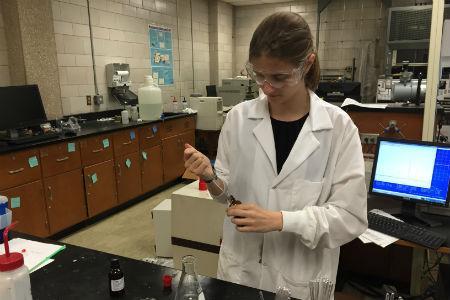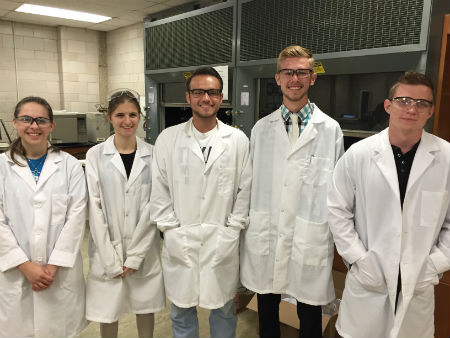Undergraduate research abounds through Welch Foundation

Above: Junior biochemistry major Charlotte Salin is part of the team of Texas Wesleyan students and faculty that are researching drug-resistant bacterial strains.
Through the support of the Robert A. Welch Foundation, students in the Department of Chemistry and Biochemistry are performing undergraduate research projects this summer.
Five chemistry and biochemistry students are working with professors Neumann, Pelphrey and Weir to research drug-resistant bacterial strains, new ways to fight tuberculosis and how nanoscience affects energy.
“One of the greatest benefits of ‘Smaller. Smarter.’ is the fact that Texas Wesleyan undergraduate students have the opportunity to conduct research,” Terrence Neumann, assistant professor of biochemistry, said. “At most universities, students must be at the graduate level before they can do research.”
The Summer Research Program encompasses an 8-week, paid internship allowing students to gain laboratory experience and develop critical-thinking skills.
Five students are participating in this year’s program: Charlotte Salin is a junior biochemistry major, Cody Dorton is a junior biochemistry major, Colton Clanton is a junior chemistry major, Forrest Kneten is a senior biochemistry major and Michelle Phillips is a senior chemistry major.
Drug-resistant bacterial strains
Dr. Phillip Pelphrey’s research is focused on the synthesis of small molecule compounds exhibiting biological activity. In one project, Charlotte Salin is synthesizing a series of novel amino acid compounds as potential modulators of the neurotransmitter glutamate. The hope is that these compounds will give insight into treatments for a variety of neurological disorders. In a second project, Cody Dorton is working on the synthesis of pyrimidine compounds that will be tested for antibiotic properties. The goal of this project is to find a drug candidate that exhibits increased activity against drug-resistant bacterial strains.
How nanoscience affects energy
Working with Dr. Michael Weir, Colton Clanton is exploring how nanoscience affects energy production and storage. They are learning how to make nanoparticles and manipulate the size, structure, and protective groups for metallic nanoparticles. These particles are then studied as potential catalysts for energy-related reactions such as oxygen reduction (used in fuel cells), electrolysis of water (solar fuels), and reduction of carbon dioxide and carbon monoxide (reducing greenhouse gas emission). The students can choose to focus in different areas including organic synthesis, nanoparticle synthesis, chemical analysis methods, and electrochemistry.
New therapies to fight tuberculosis
Dr. Terrence Neumann’s laboratory is hosting two students, Forrest Kneten and Michelle Phillips. The students are engaged in research aimed at combatting tuberculosis. By screening and designing drugs that target an essential protein for the bacterium’s survival, the goal is to identify new therapies to fight the disease.

From left to right: Michelle Phillips, Charlotte Salin, Colton Clanton, Cody Dorton and Forrest Kneten.
To learn more about research opportunities or the Welch Summer Research Program, please contact the Department of Chemistry and Biochemistry at (817) 531-5869 or ppelphrey@txwes.edu.







